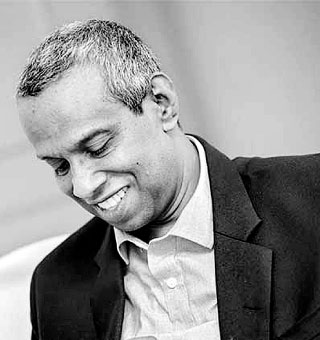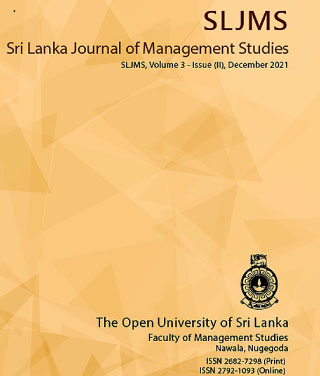Tuesday Feb 24, 2026
Tuesday Feb 24, 2026
Thursday, 15 September 2022 02:45 - - {{hitsCtrl.values.hits}}
 |
| Professor J.A.S.K. Jayakody |
 |
Volume Three, Issue Two of Sri Lanka Journal of Management Studies (SLJMS) has been released. The year 2021 can be considered as a challenging year and there is a potential for researchers and practitioners to conduct more studies with managerial implications. SLJMS provides a seamless opportunity for scholars to engage in the development of the fast-growing field of management and get published in a business journal that has an excellent reach and prospects of substantial impact.
The new issue of SLJMS is dedicated to late Professor J.A.S.K. Jayakody. Professor J.A.S.K. Jayakody served as the Director of the IHRA and he was a Professor in the Faculty of Management and Finance, at the University of Colombo at the time of his demise.
He completed B.Sc. in Management (Public) Special from the University of Sri Jayewardenepura, and MBA and Ph.D. from the Postgraduate Institute of Management of the same university. He is a Commonwealth Fellow as well. As a professor in Management Studies, I considered Professor J.A.S.K. Jayakody is the best scholar in management of our time. The vacuum he has created cannot be filled because of many reasons. He has published his articles in most of the prestigious journals in the world. Publishing in journals like International Journal of Bank Marketing, Journal of Management Development, The International Journal of Human Resource Management, Contemporary Management Research, Journal of Knowledge Management and Management Decision is a rare chance for the academic and you need to have your own defined capabilities and skills for that.
And more importantly, he has served as a member of the editorial board of Leadership, Contemporary Management Research, Sri Lankan Journal of Management, and many other journals.
Professor Jayakody is one of the most confident researchers I have seen in my life. His knowledge of research methodology and conceptualisation cannot be matched to anyone in business research in Sri Lanka. I was really fortunate to become his student for my Master’s dissertation at the University of Colombo and I managed to win the Gold Medal for the subject under the mentoring of Professor Jayakody.
He was our lecturer as well for Colombo MBA on the subject of research methodology. His knowledge, reading, and delivery of examples with proper synthesising cannot be matched. Professor Jayakody always encouraged us to publish articles in quality journals.
I could remember on the stage I was reading my Ph.D. I had a problem linking Customer Relationship Orientation (CRO) to the transformational leadership behaviour of managers for better relationship marketing. In my meeting with him, he sketched a conceptual model with multiple associations between variables on a small piece of paper. That is all about the skill of ‘conceptualisation’ which was his Unique Selling proposition (USP).
In research, he always comes up with solutions with multiple justifications. Professor J.A.S.K. Jayakody is conversant in both qualitative and qualitative research methodologies which is rare in current academia. He is always willing to share his knowledge with other institutes as well. This can be clearly demonstrated by the service he has given in the capacity of Head, Research Centre at Postgraduate Institute of Management (PIM), the University of Sri Jayewardenepura for seven years.
By organising monthly seminar series at PIM he has shown the value of disseminating knowledge which can be considered one of the turning points for budding researchers.
It is unusual to see great academics with administrative skills. If you revisit the Sri Lankan education sector for the last five decades, you would remember only a few professors like Professor V.K. Samaranayake, Professor Gunapala Nanayakkara, etc. Professor Jayakody also can be categorised as one the transformational leaders with the qualities of Individualised Consideration, Inspirational Motivation, Idealised Influence, Intellectual stimulation (which he taught me as a lecturer for leadership and he practiced them as well). He has served as the Unit Coordinator, Postgraduate and Mid-career Development Unit and the Head, Department of Management and Organisation Studies, Faculty of Management and Finance, University of Colombo.
The time he served as MBA Coordinator at the Faculty of Management and Finance, The University of Colombo was the golden time for Colombo MBA as many initiatives have been taken to improve the quality of the program in terms of teaching and learning, research, and curriculum and course delivery. As Director, Institute of Human Resource Advancement, the University of Colombo he has done many changes to position the institute as one of the best in Sri Lanka in the HR profession.
He is a great human as well. If you have a problem with research methodology, conceptualisation or data analysis Professor Jayakody is the first name that comes to your mind. The friendly approach and the way he talked to others can be remembered forever. I can remember whatever time I met him he simply asked: “kohomada mallie” (How are you brother?) which is really unique from many so-called intellectuals. One of the articles published by Professor Jayakody in the Journal of Management Development discussed “Charismatic leadership in Sri Lankan business organisations”. There is a need for Sri Lankan academia in management to have a “read” on charismatic leadership in Sri Lankan educational institutes remembering the contribution of Professor J.A.S.K. Jayakody. Hence this is the rationale for our decision to dedicate Volume Three, Issue Two of the Sri Lanka Journal of Management Studies (SLJMS) to J.A.S.K. Jayakody.
This Issue of the Sri Lanka Journal of Management Studies (SLJMS) includes twelve articles from different subject domains such as Marketing Management, Finance Management, Economics, Education Management, Accountancy, Entrepreneurship and Small Business Management and Human Resource Management. More importantly, all articles explore the challenges in business aligned with managerial implications. The current issue can be referred to via https://sljms.sljol.info/.
The editorial team invites all researchers, specialists and professionals in various disciplines of Management Studies to make a worthy contribution to the upcoming issue of this journal. Any questions, suggestions or concerns may be directed to SLJMS Editor-in-Chief, Professor Nalin Abeysekera at [email protected].